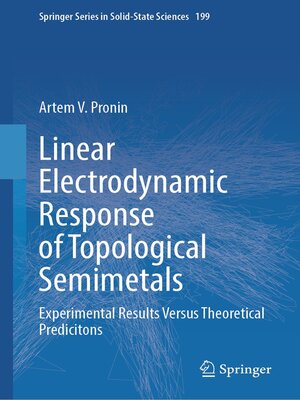Linear Electrodynamic Response of Topological Semimetals
ebook ∣ Experimental Results Versus Theoretical Predicitons · Springer Series in Solid-State Sciences
By Artem V. Pronin

Sign up to save your library
With an OverDrive account, you can save your favorite libraries for at-a-glance information about availability. Find out more about OverDrive accounts.
Find this title in Libby, the library reading app by OverDrive.



Search for a digital library with this title
Title found at these libraries:
| Library Name | Distance |
|---|---|
| Loading... |
This book provides a model description for the electromagnetic response of topological nodal semimetals and summarizes recent experimental findings in these systems. Specifically, it discusses various types of topological semimetals – Dirac, Weyl, nodal-line, triple-point, and multifold semimetals – and provides description for the characteristic features of the linear electrodynamic response for all these types of materials.
Topological semimetals possess peculiar bulk electronic band structure, which leads to unusual electrodynamic response. For example, the low-energy inter-band optical conductivity of nodal semimetals is supposed to demonstrate power-law frequency dependence and the intra- and inter-band contributions to the conductivity are often mixed. Further, the magneto-optical response is also unusual, because of the non-equidistant spacing between the Landau levels. Finally, in semimetals with chiral electronic bands, e.g. in Weyl semimetals, thesimultaneous application of parallel magnetic and electric fields leads to the chiral anomaly, i.e. to a misbalance between the electrons with diffident chiralities. This misbalance affects the electrodynamics properties of the material and can be detected optically. All these points are addressed here in detail.
The book is written for a wide audience of physicists, working in the field of topological condensed matter physics. It gives a pedagogical introduction enabling graduate students and non-experts to familiarize themselves with the subject.
Topological semimetals possess peculiar bulk electronic band structure, which leads to unusual electrodynamic response. For example, the low-energy inter-band optical conductivity of nodal semimetals is supposed to demonstrate power-law frequency dependence and the intra- and inter-band contributions to the conductivity are often mixed. Further, the magneto-optical response is also unusual, because of the non-equidistant spacing between the Landau levels. Finally, in semimetals with chiral electronic bands, e.g. in Weyl semimetals, thesimultaneous application of parallel magnetic and electric fields leads to the chiral anomaly, i.e. to a misbalance between the electrons with diffident chiralities. This misbalance affects the electrodynamics properties of the material and can be detected optically. All these points are addressed here in detail.
The book is written for a wide audience of physicists, working in the field of topological condensed matter physics. It gives a pedagogical introduction enabling graduate students and non-experts to familiarize themselves with the subject.







